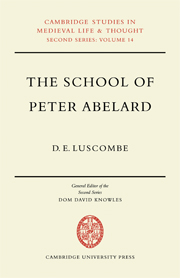Book contents
- Frontmatter
- Contents
- Preface
- List of Abbreviations
- I The Literary Evidence
- II Abelard's Followers
- III The Diffusion of Abelardian Writings
- IV The Condemnation of 1140
- V The Theological Writings of Abelard's Closest Disciples
- VI The School of Laon
- VII Hugh of St Victor
- VIII The Summa Sententiarum
- IX Abelard and the Decretum of Gratian
- X Abelard's Disciples and the School of St Victor
- XI Peter Lombard
- XII Robert of Melun
- XIII Richard of St Victor
- XIV Conclusion
- Appendices
- Bibliography
- Index of Manuscripts
- General Index
VIII - The Summa Sententiarum
Published online by Cambridge University Press: 05 November 2011
- Frontmatter
- Contents
- Preface
- List of Abbreviations
- I The Literary Evidence
- II Abelard's Followers
- III The Diffusion of Abelardian Writings
- IV The Condemnation of 1140
- V The Theological Writings of Abelard's Closest Disciples
- VI The School of Laon
- VII Hugh of St Victor
- VIII The Summa Sententiarum
- IX Abelard and the Decretum of Gratian
- X Abelard's Disciples and the School of St Victor
- XI Peter Lombard
- XII Robert of Melun
- XIII Richard of St Victor
- XIV Conclusion
- Appendices
- Bibliography
- Index of Manuscripts
- General Index
Summary
Among the works of Hugh of St Victor in Migne, PL. 176, 41–174, is found a compact sentence work, there ascribed to Hugh and known to students of the theological literature of the early twelfth century under the title of Sumtna Sententiarum ( = SS). Much of the work is a summary of sentences, a review and critique of opinions and as such it takes us inside a theological school. In some ways the SS is the Place de l'Etoile of early twelfth-century theological literature, the point of arrival and of departure and the centre of circulation for many other writings and teachings. For historians also the SS has assumed a central place in enquiries into the history of the period and one which corresponds to its influence in its own day. To the student of Abelard's influence the SS appears as a Gordian knot.
Who wrote the SS? Those manuscripts which offer an attribution do so variously: ‘Magister Odo’ ‘Odo episcopus de Luca’ ‘Odo ex dictis magistri Hugonis’, ‘iuxta magistrum Anselmum et magistrum Hugonem’, ‘Magister Hugo’. Historians have offered even more varying suggestions. Against the many who have attached the work to Hugh of St Victor, there has been another stream of opinion which has advocated in turns Hugh of Mortagne, Odo of Soissons, Odo of St Victor, Otto, perhaps of Lucca, and even Hildebert of Lavardin.
The least unsatisfactory candidate seems to be Otto, the friend of Peter Lombard and from 1138 till his death in 1145 or 1146 bishop of Lucca.
- Type
- Chapter
- Information
- The School of Peter AbelardThe Influence of Abelard's Thought in the Early Scholastic Period, pp. 198 - 213Publisher: Cambridge University PressPrint publication year: 1969

